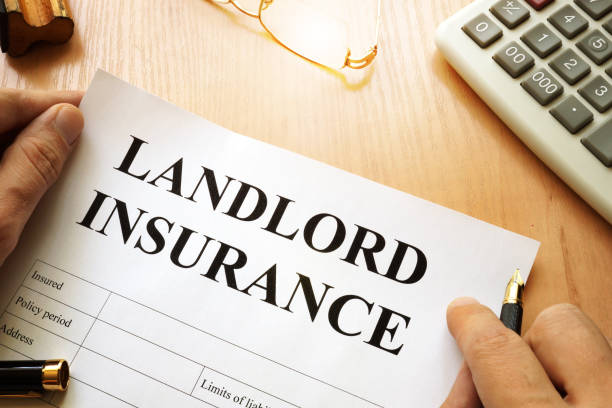
Landlord Insurance: Protecting Your Rental Property Investment
As a landlord, you’ve made a significant investment in your rental properties. Whether you own a single unit or a portfolio of properties, it’s crucial to safeguard your assets from potential risks and liabilities. This is where landlord insurance comes into play, providing comprehensive coverage tailored to the unique needs of property owners who rent out their properties.
In this comprehensive guide, we’ll explore the ins and outs of landlord insurance, including what it covers, why it’s essential, and how to choose the right policy for your specific needs.
What is Landlord Insurance?
Landlord insurance, also known as rental property insurance or rental dwelling insurance, is a specialized type of insurance policy designed specifically for landlords and property owners who rent out their residential properties. It offers protection against various risks associated with owning and managing rental properties, such as property damage, liability claims, and loss of rental income.
While homeowners insurance policies typically cover owner-occupied residences, they do not provide adequate coverage for the unique risks faced by landlords. Landlord insurance fills this gap by addressing the specific concerns and liabilities that come with renting out a property.
What Does Landlord Insurance Cover?
Landlord insurance policies can vary in their coverage options, but most standard policies include the following core protections:
Dwelling Coverage (Property Damage)
This coverage protects the physical structure of your rental property against covered perils such as fire, storms, vandalism, and theft. It covers the cost of repairing or rebuilding the property in the event of damage or destruction.
Other Structures Coverage
This coverage extends protection to other structures on your rental property, such as detached garages, sheds, or fences.
Personal Property Coverage
If you provide furniture, appliances, or other personal property for your tenants’ use, this coverage can help replace or repair those items if they are damaged or stolen.
Liability Protection
As a landlord, you can be held legally responsible for injuries or damages that occur on your rental property. Liability coverage helps protect you from financial losses resulting from lawsuits related to bodily injury or property damage claims made by tenants, guests, or other third parties.
Loss of Rental Income
If your rental property becomes uninhabitable due to a covered peril, such as a fire or natural disaster, this coverage can provide reimbursement for the lost rental income during the period when the property is being repaired or rebuilt.
Fair Rental Value
In some cases, your rental property may be partially damaged, making it habitable but less desirable to tenants. Fair rental value coverage can help compensate you for the reduced rental income you may receive due to the property’s diminished condition.
Why is Landlord Insurance Important?
As a landlord, you face numerous risks and potential liabilities that can threaten your investment and financial well-being. Landlord insurance plays a crucial role in mitigating these risks and protecting your assets. Here are some key reasons why landlord insurance is essential:
ProtectsYour Investment
Your rental properties represent a significant financial investment, and landlord insurance helps safeguard that investment against various perils and potential losses. Without adequate coverage, a single incident, such as a fire or natural disaster, could result in devastating financial consequences.
Provides Liability Protection
As a property owner, you can be held legally responsible for injuries or damages that occur on your rental premises. Liability coverage protects you from costly lawsuits and financial losses resulting from third-party claims.
Covers Loss of Rental Income
If your rental property becomes uninhabitable due to a covered peril, landlord insurance can provide reimbursement for the lost rental income during the repair or rebuilding period. This coverage can help you maintain your financial stability and meet ongoing expenses.
Meets Legal Requirements
In some states or municipalities, landlord insurance may be a legal requirement for operating a rental property. Failure to maintain adequate coverage could result in fines, penalties, or other legal consequences.
Enhances Tenant Satisfaction
By having landlord insurance, you can promptly address repairs and maintenance issues, improving the overall living experience for your tenants and reducing the likelihood of tenant disputes or legal actions.
Choosing the Right Landlord Insurance Policy
With a variety of landlord insurance policies available in the market, selecting the right coverage can be a daunting task. Here are some key factors to consider when choosing a landlord insurance policy:
Coverage Limits
Evaluate the coverage limits offered by different policies to ensure they align with the value of your rental property and potential liability risks. It’s crucial to strike a balance between adequate coverage and affordability.
Deductibles
Most landlord insurance policies come with deductibles, which are the out-of-pocket expenses you’ll need to pay before the insurance coverage kicks in. Consider your financial situation and risk tolerance when choosing the appropriate deductible amount.
Policy Exclusions
Carefully review the policy exclusions to understand what is not covered by the insurance. Common exclusions may include damage caused by floods, earthquakes, or wear and tear.
Additional Coverages
Depending on your specific needs, you may want to consider additional coverages or endorsements, such as:
– Flood insurance
– Earthquake insurance
– Umbrella liability coverage
– Emergency protection services (e.g., board-up services, temporary repairs)
Reputation and Financial Strength of the Insurer
Research the insurance company’s reputation, financial stability, and claims handling process. Working with a reputable and financially sound insurer can provide peace of mind and ensure prompt and fair claims settlement.
Customization Options
Look for insurance providers that offer customizable policies tailored to your unique needs as a landlord. This may include options for insuring multiple properties, adjusting coverage limits, or adding specialized endorsements.
Cost and Discounts
While cost should not be the sole determining factor, it’s essential to compare premiums from different insurance providers to find a policy that fits your budget. Additionally, inquire about available discounts for bundling policies, installing security systems, or maintaining a good claims history.
Best Practices for Landlords
In addition to securing the right landlord insurance policy, there are several best practices that can help you mitigate risks, maintain compliance, and protect your investment:
Conduct Thorough Tenant Screening
Implementing a rigorous tenant screening process can help reduce the risk of property damage, late rent payments, and potential legal disputes. Verify employment, income, credit history, and references to ensure you’re selecting responsible and reliable tenants.
Maintain Detailed Documentation
Keep accurate and up-to-date records of all rental agreements, lease terms, inspections, maintenance requests, and communications with tenants. This documentation can be invaluable in the event of a dispute or insurance claim.
Regularly Inspect and Maintain the Property
Conduct regular inspections of your rental property to identify and address any potential issues or maintenance needs promptly. Neglecting maintenance can lead to costly repairs and potential liability claims.
Implement Risk Management Strategies
Develop and implement risk management strategies to minimize potential hazards and liabilities. This may include installing smoke detectors, carbon monoxide detectors, and security systems, as well as addressing safety concerns and removing potential hazards.
Stay Compliant with Local Laws and Regulations
Familiarize yourself with local landlord-tenant laws, building codes, and regulations to ensure compliance and avoid potential legal issues or fines.
Foster Open Communication with Tenants
Maintain open lines of communication with your tenants and promptly address any concerns or issues they may have. A positive landlord-tenant relationship can go a long way in preventing disputes and minimizing risks.
Review and Update Your Policy Regularly
As your rental property portfolio or circumstances change, review and update your landlord insurance policy to ensure it continues to provide adequate coverage and protection.
Landlord Insurance for Different Property Types
While the core principles of landlord insurance remain the same, the specific coverage needs may vary depending on the type of rental property you own. Here’s a closer look at landlord insurance considerations for different property types:
Single-Family Homes
For landlords renting out single-family homes, the primary focus should be on protecting the physical structure, personal property (if included), and liability coverage. Loss of rental income and fair rental value coverage may also be essential if the property becomes uninhabitable or less desirable due to a covered peril.
Multi-Unit Properties (Apartments, Condominiums)
For multi-unit properties, landlord insurance policies may need to be more comprehensive to address the additional risks and complexities involved. In addition to the standard coverages, you may need to consider additional endorsements or higher coverage limits to account for the increased number of tenants and potential liabilities.
Vacation Rentals (Airbnb, VRBO)
Landlords who rent out their properties for short-term vacation rentals may face unique challenges and risks. Many standard landlord insurance policies may not cover short-term rentals, so you may need to explore specialized vacation rental insurance or endors Landlords who rent out their properties for short-term vacation rentals may face unique challenges and risks. Many standard landlord insurance policies may not cover short-term rentals, so you may need to explore specialized vacation rental insurance or endorsements to your existing policy. These specialized coverages can address risks associated with frequent guest turnover, increased liability exposure, and potential income loss due to cancellations or damages.
Commercial Properties
If you own commercial rental properties, such as office spaces, retail units, or industrial buildings, you’ll likely need a commercial property insurance policy tailored to the specific risks and requirements of these types of properties. Commercial landlord insurance typically includes coverages like business income loss, equipment breakdown, and tenant discrimination liability.
Mixed-Use Properties
For properties that combine residential and commercial spaces, you may need a combination of landlord insurance and commercial property insurance. Consult with an insurance professional to ensure that all aspects of your mixed-use property are adequately covered.
Working with Insurance Agents and Brokers
Navigating the complexities of landlord insurance can be challenging, especially if you’re new to the world of rental property ownership. This is where the expertise of insurance agents and brokers can prove invaluable.
The Role of Insurance Agents
Insurance agents are licensed professionals who represent one or more insurance companies and sell their products to consumers. As a landlord, working with an experienced agent can provide several benefits, including:
– Guidance and Recommendations: A knowledgeable agent can assess your specific needs and risks, and recommend appropriate coverage options and policy limits.
– Policy Comparisons: Agents can compare policies from different insurers, helping you find the most comprehensive and cost-effective solution.
– Claims Assistance: In the event of a claim, your agent can guide you through the claims process, ensuring that your rights are protected and your claim is handled efficiently.
– Ongoing Support: As your rental property portfolio or circumstances change, your agent can provide ongoing support and advice to ensure your coverage remains up-to-date and adequate.
The Role of Insurance Brokers
Insurance brokers act as intermediaries between consumers and insurance companies, working on behalf of their clients to find the best coverage options and negotiate favorable terms. Brokers can be particularly beneficial for landlords with unique or complex insurance needs, as they can:
– Access a Wider Range of Insurers: Brokers work with multiple insurance providers, giving them a broader pool of options to find the most suitable policy for your specific requirements.
– Provide Impartial Advice: As independent professionals, brokers can offer unbiased guidance and recommendations without being tied to a particular insurance company.
– Negotiate Better Terms: With their industry knowledge and negotiating skills, brokers may be able to secure more favorable terms, rates, or endorsements on your landlord insurance policy.
Choosing the Right Agent or Broker
When selecting an insurance agent or broker, consider the following factors:
– Experience and Expertise: Look for professionals with extensive experience in landlord insurance and a deep understanding of the unique risks and challenges faced by rental property owners.
– Credentials and Licenses: Ensure that the agent or broker is properly licensed and certified to operate in your state or region.
– Reputation and Reviews: Research the professional’s reputation by reading online reviews, asking for referrals, or checking with industry organizations.
– Communication and Customer Service: Evaluate the agent or broker’s communication skills, responsiveness, and commitment to providing excellent customer service.
– Area of Specialization: If you own a specific type of rental property (e.g., vacation rentals, commercial properties), consider working with an agent or broker who specializes in that area.
By partnering with a knowledgeable and reputable insurance agent or broker, you can navigate the complexities of landlord insurance with greater confidence, ensuring that your rental property investment is adequately protected.
Handling Claims and Disputes
Despite your best efforts to mitigate risks and maintain a safe rental property, incidents and disputes may still arise. When such situations occur, having a comprehensive landlord insurance policy and understanding the claims process can be invaluable.
Filing a Claim
If you need to file a claim with your landlord insurance provider, follow these steps:
– Notify Your Insurer Promptly: Report the incident or loss to your insurance company as soon as possible, as delays can potentially jeopardize your claim.
– Gather Documentation: Collect all relevant documentation, such as photographs, receipts, repair estimates, and any police or incident reports, to support your claim.
– Cooperate with the Claims Process: Provide your insurance company with any additional information or documentation they request, and respond promptly to their inquiries.
– Mitigate Further Damage: Take reasonable steps to prevent further damage or loss, as most insurance policies require policyholders to mitigate potential losses.
Common Claims Scenarios
Here are some common scenarios that may require you to file a claim with your landlord insurance policy:
– Property Damage: If your rental property suffers damage due to a covered peril, such as a fire, storm, or vandalism, you can file a claim for the cost of repairs or rebuilding.
– Liability Claims: If a tenant or third party is injured on your rental property and files a lawsuit against you, your liability coverage can help cover legal fees and potential settlements or judgments.
– Loss of Rental Income: If your rental property becomes uninhabitable due to a covered peril, you can file a claim for the loss of rental income during the repair or rebuilding period.
– Theft or Vandalism: If your rental property is burglarized or vandalized, you can file a claim to cover the cost of repairing or replacing any damaged or stolen items.
Handling Disputes
Despite your best efforts, disputes may arise between you and your insurance company over the handling of a claim or the coverage provided. In such cases, it’s important to remain calm and follow the proper procedures for resolving the dispute.
– Review Your Policy: Carefully review your landlord insurance policy to understand the specific coverages, exclusions, and conditions that apply to your claim.
– Document Everything: Keep detailed records of all communications, correspondence, and documents related to your claim and the dispute.
– Escalate Within the Insurance Company: If you encounter issues with the claims adjuster or initial decision, escalate the matter to a supervisor or the company’s claims department management.
– Seek Professional Assistance: If the dispute persists, consider seeking assistance from a public adjuster, an attorney specializing in insurance disputes, or your state’s insurance regulatory agency.
Preventing Future Disputes
To minimize the likelihood of disputes and ensure a smoother claims process, consider the following preventive measures:
– Choose a Reputable Insurer: Research and select an insurance company with a strong reputation for fair claims handling and customer service.
– Understand Your Policy: Take the time to thoroughly read and understand your landlord insurance policy, including the coverages, exclusions, and conditions.
– Maintain Detailed Records: Keep accurate and up-to-date records of your rental property, including maintenance logs, inspections, and tenant communications.
– Communicate Openly with Your Insurer: Maintain open lines of communication with your insurance company, promptly reporting any changes or incidents that may affect your coverage.
By being proactive, following proper claims procedures, and seeking professional assistance when necessary, you can navigate the claims and dispute resolution process more effectively, protecting your rights and ensuring fair treatment from your landlord insurance provider.
Landlord Insurance and Risk Management
While landlord insurance is a crucial component of protecting your rental property investment, it should be part of a comprehensive risk management strategy. By implementing effective risk management practices, you can minimize the likelihood of incidents and claims, potentially reducing your insurance premiums and ensuring the long-term success of your rental property business.
Conducting Risk Assessments
The first step in effective risk management is to identify and assess the potential risks associated with your rental properties. This can include:
– Property Risks: Evaluate the physical condition of your rental properties, identifying potential hazards, maintenance needs, or areas requiring upgrades or renovations.
– Operational Risks: Assess the risks associated with your day-to-day operations, such as tenant screening processes, lease agreements, and property management practices.
– Environmental Risks: Consider the potential impact of natural disasters, severe weather events, or environmental hazards on your rental properties.
– Legal and Regulatory Risks: Ensure compliance with local, state, and federal laws and regulations related to rental properties, such as fair housing laws, building codes, and landlord-tenant laws.
Implementing Risk Mitigation Strategies
Once you’ve identified potential risks, develop and implement strategies to mitigate or eliminate those risks. These strategies may include:
– Regular Property Maintenance and Inspections: Establish a proactive maintenance schedule and conduct regular inspections to identify and address potential issues before they escalate.
– Tenant Screening and Selection: Implement thorough tenant screening processes, including credit checks, employment verification, and reference checks, to minimize the risk of problematic tenants.
– Safety and Security Measures: Install appropriate safety and security measures, such as smoke detectors, security systems, and well-lit common





